Related Research Articles
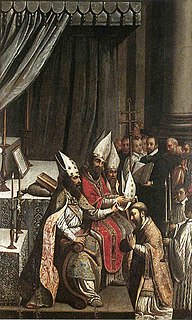
Apostolic succession is the method whereby the ministry of the Christian Church is held to be derived from the apostles by a continuous succession, which has usually been associated with a claim that the succession is through a series of bishops. This series was seen originally as that of the bishops of a particular see founded by one or more of the apostles. According to historian Justo L. González, apostolic succession is generally understood today as meaning a series of bishops, regardless of see, each consecrated by other bishops, themselves consecrated similarly in a succession going back to the apostles. According to the Joint International Commission for Theological Dialogue Between the Catholic Church and the Orthodox Church, "apostolic succession" means more than a mere transmission of powers. It is succession in a Church which witnesses to the apostolic faith, in communion with the other Churches, witnesses of the same apostolic faith. The "see (cathedra) plays an important role in inserting the bishop into the heart of ecclesial apostolicity", but, once ordained, the bishop becomes in his Church the guarantor of apostolicity and becomes a successor of the apostles.
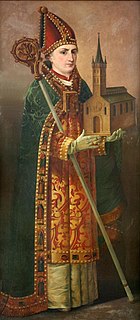
Saint Ansgar, also known as Anskar, Saint Anschar or Oscar, was Archbishop of Hamburg-Bremen in the northern part of the Kingdom of the East Franks. Ansgar became known as the "Apostle of the North" because of his travels and the See of Hamburg received the missionary mandate to bring Christianity to Northern Europe.
A bishop is an ordained, consecrated, or appointed member of the Christian clergy who is generally entrusted with a position of authority and oversight.
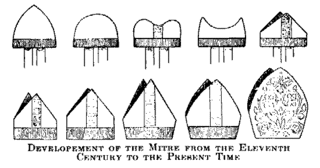
An episcopal polity is a hierarchical form of church governance in which the chief local authorities are called bishops. It is the structure used by many of the major Christian Churches and denominations, such as the Catholic, Eastern Orthodox, Oriental Orthodox, Church of the East, Anglican, and Lutheran churches or denominations, and other churches founded independently from these lineages.

In certain Christian churches, holy orders are ordained ministries such as bishop, priest, or deacon, and the sacrament or rite by which candidates are ordained to those orders. Churches recognizing these orders include the Catholic Church, the Eastern Orthodox, Oriental Orthodox, Anglican, Assyrian, Old Catholic, Independent Catholic and some Lutheran churches. Except for Lutherans and some Anglicans, these churches regard ordination as a sacrament. The Anglo-Catholic tradition within Anglicanism identifies more with the Roman Catholic position about the sacramental nature of ordination.
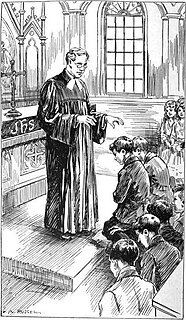
In Christian denominations that practice infant baptism, confirmation is seen as the sealing of Christianity created in baptism. Those being confirmed are known as confirmands. In some denominations, such as the Anglican Communion and Methodist Churches, confirmation bestows full membership in a local congregation upon the recipient. In others, such as the Roman Catholic Church, confirmation "renders the bond with the Church more perfect", because, while a baptized person is already a member, "reception of the sacrament of Confirmation is necessary for the completion of baptismal grace".
The Evangelical Lutheran Church in America (ELCA) is a mainline Protestant Lutheran Church headquartered in Chicago, Illinois. The ELCA officially came into existence on January 1, 1988, by the merging of three Lutheran church bodies. As of 2018, it has approximately 3.4 million baptized members in 9,091 congregations.
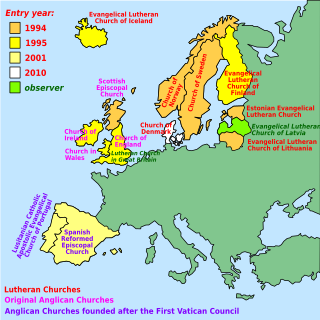
The Porvoo Communion is a communion of 15 predominantly northern European, with a couple of far-southwestern European Anglican and Evangelical Lutheran church bodies. It was established in 1992 by a theological agreement entitled the Porvoo Common Statement which establishes full communion between and among these churches. The agreement was negotiated in the town of Järvenpää in Finland, but the communion's name comes from the nearby city of Porvoo where there was a joint celebration of the Eucharist in Porvoo Cathedral after the formal signing in Järvenpää.
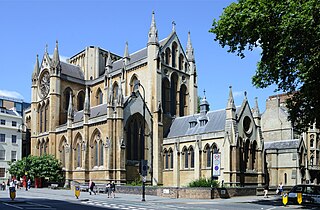
The Catholic Apostolic Church was a religious movement which originated in England around 1831 and later spread to Germany and the United States. While often referred to as Irvingism or the Irvingian movement, it was neither founded nor anticipated by Edward Irving. The church was organised in 1835 under the lead of self-proclaimed apostles.

The Mission Province is a Swedish independent ecclesiastical province founded by members of the "orthodox opposition" to the ordination of women to the priesthood and episcopate. The province considers itself as a free-standing diocese within the Church of Sweden, a position rejected by the church itself. The Mission Province was founded on 6 September 2003, following the establishment of the Nordic Catholic Church in Norway.
Apostolicae curae is the title of a papal bull, issued in 1896 by Pope Leo XIII, declaring all Anglican ordinations to be "absolutely null and utterly void". The archbishops of Canterbury and York of the Church of England responded to the papal charges with the encyclical Saepius officio in 1897.

High Church Lutheranism is a movement which began in 20th-century Europe that emphasizes worship practices and doctrines that are similar to those found within both Roman Catholicism and the Anglo-Catholic wing of Anglicanism. In the more general usage of the term it describes the general High Church characteristics of Lutheranism in the Nordic countries such as Sweden, Finland and the Baltics. The mentioned countries, once a part of the Swedish Empire, have more markedly preserved Catholic traditions.
Catholicity is a concept pertaining to beliefs and practices widely accepted across numerous Christian denominations, most notably those that describe themselves as Catholic in accordance with the Four Marks of the Church, as expressed in the Nicene Creed of the First Council of Constantinople in 381: "[I believe] in one, holy, catholic, and apostolic Church."

The sacrament of holy orders in the Catholic Church includes three orders: bishop, priest, and deacon. In the phrase "holy orders", the word "holy" simply means "set apart for some purpose." The word "order" designates an established civil body or corporation with a hierarchy, and ordination means legal incorporation into an order. In context, therefore, a group with a hierarchical structure that is set apart for ministry in the Church.

The priesthood is one of the three holy orders of the Catholic Church, comprising the ordained priests or presbyters. The other two orders are the bishops and the deacons. Only men are allowed to receive holy orders, and the church does not allow any transgender people to do so. Church doctrine also sometimes refers to all baptised Catholics as the "common priesthood".

The Four Marks of the Church, also known as the Attributes of the Church, is a term describing four distinctive adjectives—"one, holy, catholic and apostolic"—of traditional Christian ecclesiology as expressed in the Niceno-Constantinopolitan Creed completed at the First Council of Constantinople in AD 381: "[We believe] in one, holy, catholic, and apostolic Church." This ecumenical creed is today recited in the liturgy of the Catholic Church, the Eastern Orthodox Churches, the Oriental Orthodox Churches, the Church of the East, the Moravian Church, the Lutheran Churches, the Methodist Churches, the Presbyterian Churches, the Anglican Communion and by members of many Reformed Churches.
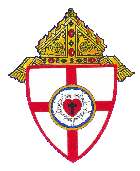
The Augustana Catholic Church (ACC), formerly the Anglo-Lutheran Catholic Church (ALCC) and the Evangelical Community Church-Lutheran (ECCL), is an American church in the Lutheran Evangelical Catholic tradition. The ACC says it is unique among Lutheran churches in that it is of both Lutheran and Anglo-Catholic heritage and has also been significantly influenced by the Roman Catholic Church. The church was founded in 1997 by former members of the Lutheran Church–Missouri Synod. Its headquarters are in Pittsburgh, Pennsylvania. The ACC has long had a policy of seeking union with the Roman Catholic Church and announced in 2011 that it would accept the conditions of Anglicanorum coetibus and join the personal ordinariates as they are established. Later developments on limitations of joining the ordinariate caused the ACC to hold their offer while they established intercommunion with groups such as the Old Roman Catholic Church of North America. The church claims a membership in excess of 60,000 in 12 countries.
Helmut Friedbert Richard Siegfried Echternach was a German Lutheran theologian and pastor, and one of the leaders of the Lutheran High Church Movement in Germany.
Hochkirchliche St. Johannes-Bruderschaft (SJB) is a German High Church Lutheran religious society for men and women under the patronate of John the Apostle within the Hochkirchliche Vereinigung. It has about 100 members in Germany, Netherlands, Austria and Czech Republic. It is headed by Apostolischer Vorsteher +Innocenz Konrad Schrieder.

Confirmation in the Lutheran Church is a public profession of faith prepared for by long and careful instruction. In English, it is called "affirmation of baptism", and is a mature and public reaffirmation of the faith which "marks the completion of the congregation's program of confirmation ministry".
References
- ↑ "Sukzessionsliste: Die Sukzessionsliste des Hochkirchlichen Apostolats St.Ansgar". Hochkirchlicher Apostolat St.Ansgar. Retrieved 22 January 2019.